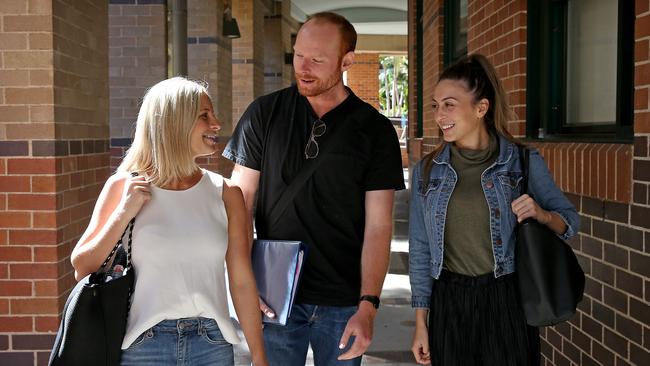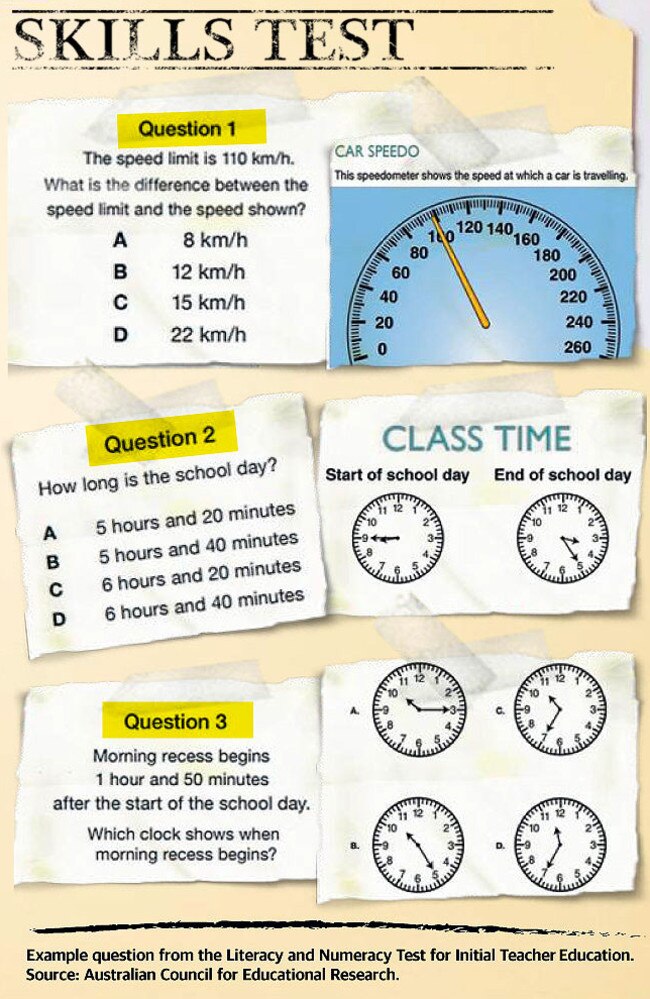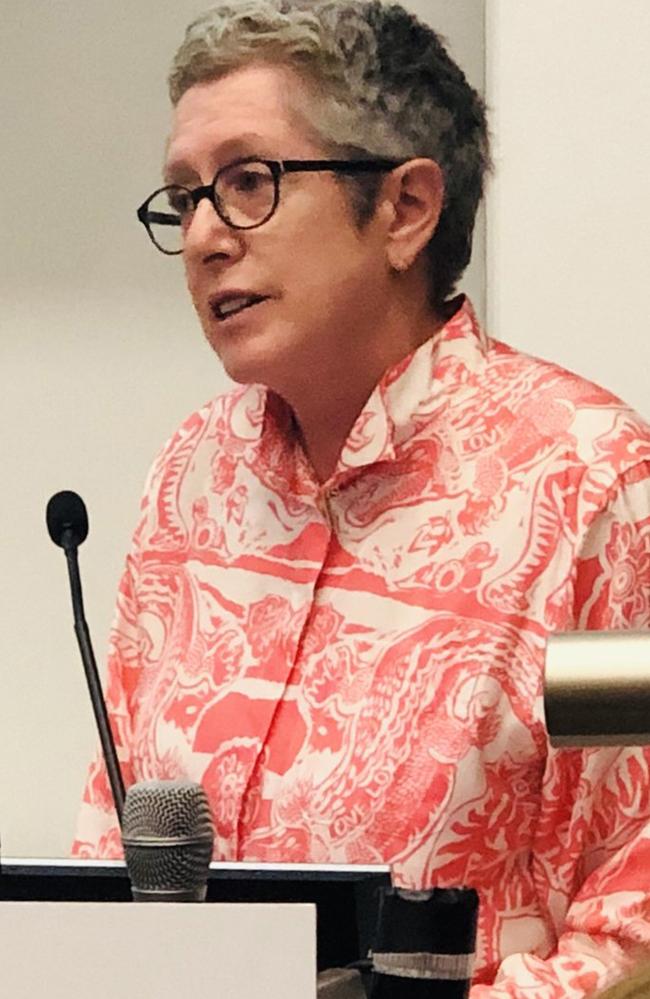Teaching graduates get five chances to pass basic skills test
Poorly performing teaching students are still reaching the classroom because they are being given up to five chances to pass a basic skills test which includes questions as simple as telling the time.
EXCLUSIVE: Poorly performing teaching students are still reaching the classroom because they are being given up to five chances to pass a basic skills test which includes questions as simple as telling the time.
The compulsory Literacy and Numeracy Test for Initial Teacher Education (LANTITE) was meant to weed out poor teachers before they graduated from universities.

MORE NEWS:
Sex abuse victim brings down attacker in police sting
Harriet Wran could now face fraud charges
Sam, Phoebe Burgess back on after split
The basic skills test was designed to combat a lowering of the academic standard of students enrolling in teaching.
In 2005 a third of teaching entrants scored the equivalent of an Australian Tertiary Admission Rank (ATAR) of 80 and above in their HSC but in the decade since that number has dropped to one in five.
One in ten students fail the LANTITE test the first time.
Sample questions include determining when a recess break begins if school commences at 8.45am and the break is one hour and 50 minutes later.

Students who failed the LANTITE test are being sent to special coaching workshops or being told to hire a tutor for the test which was introduced in 2015 by the federal government.
Labor Education spokeswoman Tanya Plibersek said the failure for the basic test was not acceptable.
“Extraordinarily, nearly one in 10 teaching students reach the end of their degree unable to pass a relatively simple literacy and numeracy test. That’s just not acceptable,” she said.
She said Australia needed to lift ATAR entry scores to enhance the status of teaching so people didn’t view it as a fallback option.
“Parents, and even teachers, are telling students they shouldn’t ‘waste’ a high ATAR on a teaching degree. That is a tragedy and the beginning of a dangerous spiral,” she said.
She said a Labor government would give out cash bonus of up to $40,000 to attract the best and brightest into teaching degrees.
Labor would also consider capping places in universities so they were only admitting the best and brightest.

At the beginning of this semester the University of Notre Dame new education students gathered in the college’s St Benedict’s Hall and were told by senior lecturer Dr Gerard McRae the LANTITE test was introduced because of the media.
“Because someone said to someone who worked at Channel 7 who said, ‘I was talking to a teacher today, that teacher couldn’t spell’,” he said.
“So suddenly all the teachers in the nation can’t spell, we’ve got a literacy crisis and our ranking is going to go down, our economy is going to go down the toilet.”
He said 15 per cent of those in the course typically failed.
“Bear in mind that each sitting for the test around 85 per cent of students pass LANTITE the first time,” he said.
The University has developed special additional courses in literacy and numeracy at the university’s study centre.
He said failing students could get a tutor or invest in text books such as Cambridge Education’s LANTITE Edge.
Minister for Education Dan Tehan said the test was administered by the The Australian Council for Educational Research (ACER) and anyone with “evidence of impropriety in relation to the test should contact ACER.”
University of Notre Dame Australia Education Dean Dr Lauren Stephenson said the school must provide academic support should a student require a fourth or fifth sitting, which included coaching students in the study centre.
“At Notre Dame we have a range of strategies to support student success, and their health and wellbeing, including support from the Study Centre, mentoring programs, advising and workshops,” she said.
“If a full LANTITE pass is not achieved after a fifth sitting, the University recommends an alternative or exit degree pathway/program.”
The University of Sydney requires an ATAR of 80 and student Sophie Goddard said you needed to have mastered the basics in the LANTITE test to be a good teacher.
“The LANTITE is pretty much like you’re doing year 6, that sort of level of literacy and numeracy … If you’re not passing the LANTITE you shouldn’t be doing teaching,” she said.
“We know there is a huge oversupply of teachers but the universities just keep pumping them through.”
DUNCES LANDING TEACHING DEGREES
Universities are offering underperforming HSC students entry into teaching degrees, in spite of government rules aimed at weeding out subpar candidates from becoming teachers.
Below-average students were banned from studying teaching after it was revealed in 2015 students with Australia Tertiary Admission Rank (ATARs) as low as 30 were gaining entry into the profession.
The NSW government implemented the Great Teaching, Inspired Learning scheme.
Under the changes, prospective teachers were required to have achieved a mark of at least 80 per cent in three HSC subjects, at least one of which had to be English.
At least three universities are now flagrantly using a loophole to actively try to recruit poor-performing students so there is no restriction on their entry.
The NSW Standards Authority said students who didn’t make the grade could “enrol in an accredited degree and pass a full year of discipline studies in the subjects they will teach, prior to studying teaching.”
But the University of Newcastle is admitting students straight into their bachelor of teaching courses.
“Applicants who have met the university’s entry requirements but have not achieved three HSC Band 5s will be admitted directly into their chosen teacher education program,” its website states.
“Successfully complete (pass grades or higher) the full first year of studies (80 units) of your teaching degree and you will be deemed to have met the HSC Band 5 requirements. You can then continue straight into the second year of the program.”
A University of Newcastle spokeswoman defended admitting students straight into teaching on the basis they must successfully pass the first year of the course.
“Those students who may not have three HSC Band 5s are required to successfully complete the full first year of studies — of their teacher education degree, (as well as meet other university entry requirements for admission) — before they progress to year two.”
At the University of New England, students were also told they can enter a teaching degree “even if you don’t meet the NSW Education Standards Authority (NESA) 3 Bands 5s including one in English requirement, because we’ve integrated the study to meet the requirement in the first year of the degrees.”
A spokeswoman for the university said it was compliant with the rules.
“The value of the three Band 5s rule is debatable as education courses are connected to so many points of confirmation of quality and compliance with national standards, that it may be seen as an unnecessary additional requirement for teacher education course entry,” she said.
Australian Catholic University is also allowing students into courses who don’t meet the three Band 5 entry requirements.
“This course is structured to allow applicants to meet the three Band 5 entry requirements within the degree program by including a full year of discipline studies before applicants study how to teach,” its website says.
ACU Executive Dean of Education Professor Elizabeth Labone said: “All entry pathways for enrolling in ITE at ACU have been approved, and continue to be monitored, by NESA.”
“ACU continues to ensure we meet the relevant accreditation requirements.”
Labor education spokesman Jihad Dib said exploiting this loophole was “against the spirit of the reform”.
University of Sydney Prof Rachel Wilson said the number of teachers being admitted with ATARs of less than 50 had continued to grow.
TEACHERS TO CONSIDER VIEW FROM THE NAUGHTY CORNER
The future generation of teachers is being taught that classroom control isn’t about “behaviour management” but rather “behaviour support”.
At the University of Sydney, teaching students are told that when a child is being disruptive it’s because their teaching isn’t engaging enough, not that the child is naughty.
University of Sydney School of Education head Prof Debra Hayes said teachers should focus on relationships.
“What we say to our students is that they have to become more engaging, they have to develop better relationships,” she said.

When students misbehave, teachers needed to ask themselves a series of questions.
“A teacher always has to check, are they being respectful? Are they having fair and equal expectations of their students? They’re not favouring kids, unduly putting kids under pressure to perform if they feel uncomfortable or out of their comfort zone or are they matching their expectations with what the children are able to do.”
She said sometimes it was best not to call out poor behaviour during the lesson.
“Sometimes not focusing on the kid is important, just leaving the kid alone, if they’re not engaging and not causing too much disruption, quite often a quiet word after class (works).”
University of Sydney primary education student Monica Monevski said the misbehaving child was trying to communicate something.
“They’re trying to show you something, they could be showing you they’re not interested in your subject,” she said.
LIFT STANDARD TO MAKE LEARNING GREAT AGAIN
Comment by education reporter Christopher Harris
State and federal governments have been trying to lift the status of teaching for years.
But we can see today their efforts so far have failed.
Underperforming HSC students are still being admitted to universities because of loopholes, while basic skills tests designed to weed out the unsuitable teachers have been undermined by giving students not one, but five, attempts at the test.
The number of people with a low ATAR between 30 and 50 entering teaching courses trebled in the 10 years to 2015, and education experts say that upward trend has subsequently continued.
Teaching is an incredibly difficult job. It requires a unique mix of academic, social and pragmatic skills.
As education reporter I have seen countless examples of teachers who can’t spell or conjugate a verb correctly.
Not everyone has to be a literacy or numeracy whiz, but if we want to give our kids a shot at being the best, they need to be taught by people who have strong foundational knowledge.
We need the smartest and most suitable educating the next generation.
That means lifting the minimum to an ATAR of 80.


